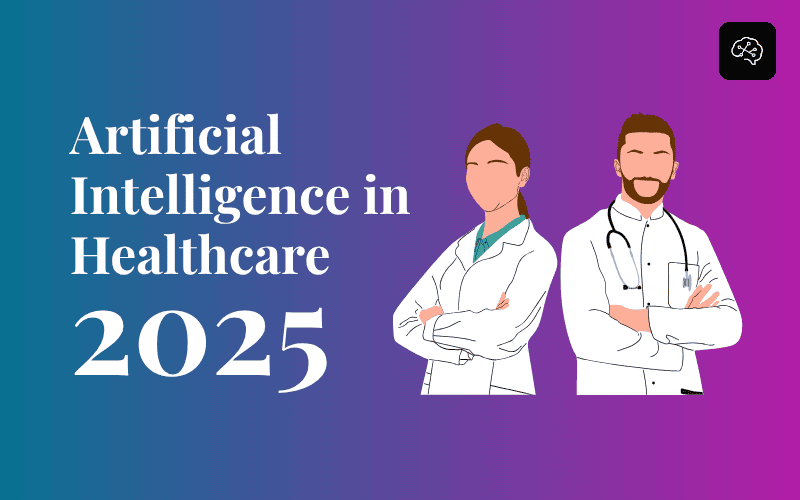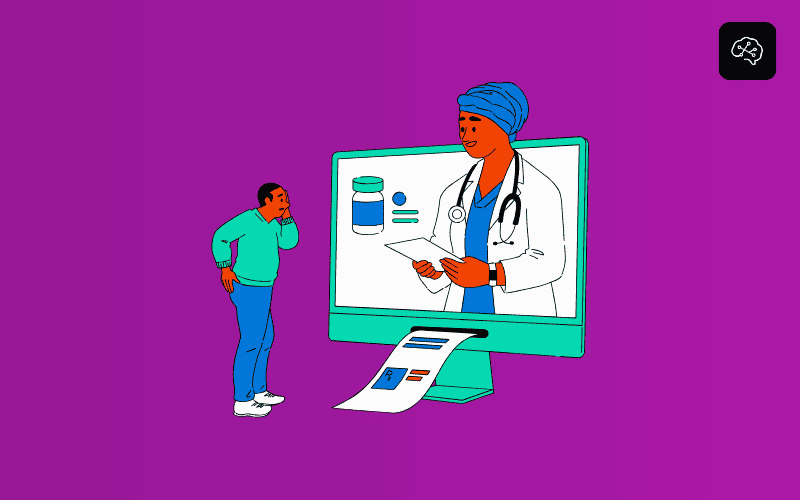Artificial Intelligence in Healthcare is no longer a futuristic concept; it’s already transforming the way significant industries operate, including healthcare included. From speeding up the diagnosis of ailments to tailoring treatments to patients, AI is helping the people who work in doctors offices, hospitals and clinics to perform their jobs better and more effectively. For instance, Artificial Intelligence in healthcare is not only enhancing patient care but also helps reduce costs and save time.
Recently, AI tools have started to process huge volumes of medical data. This aids in early diagnosis, suggesting treatments and even managing hospital paperwork. In this article, we’ll cover how Artificial Intelligence in Healthcare works, what technologies that can utilize AI, where it’s being applied, the benefits and what the future may look like.
What Is Artificial Intelligence in Healthcare?
Artificial intelligence in healthcare refers to using smart software and machines to perform tasks that normally would require human intelligence. These AI systems are capable of reading, analyzing and understanding complex medical data. And they’re not here to replace doctors but to complement them. They assist in quicker and smarter decision-making in the form of disease diagnoses, treatment planning and patient management.
As AI in marketing analyze customer personas and examines their behavior, Artificial Intelligence in Healthcare study patient data and identifies if there are any issues or recommends treatment solutions.

How Does AI Work in Healthcare?
Machine learning, deep learning and natural language processing (NLP) are the main technologies at the root of AI in medical systems. Here’s how it works:
1. Data Collection and Processing
Step one is to gather health data. This data represents electronic health records (EHRs), lab results, doctor’s notes, medical images and information from fitness trackers or wearable devices. This data is cleaned and organized to be usable through AI tools. And that’s how AI writing tools take inputs and organize them into clean content.
2. Training the AI Model
After preparing these data, AI utilizes a machine-learning model that will read the patterns that exist in these data. For instance, after analyzing thousands of images from X-rays an AI system can be trained to find problems such as broken bones, tumors, or infections. It can also forecast how a disease could progress based on a patient’s medical history.
3. Making Smart Decisions
Once the AI model is trained, real-time suggestions can be made. It could flag a potential disease, suggest a treatment, or assist with drug dosage. Similar to how AI tools in marketing assist in content decisions or budget decisions, Artificial Intelligence in Healthcare guides doctors to make smarter, faster and more accurate choices.
Main Uses of AI in Healthcare
AI in healthcare is changing the way hospitals work. From reading medical scans to helping doctors come up with treatment plans, AI makes things faster, smarter and easier. It also helps with tasks like booking appointments and prescribing medicines, improving care for every patient.
Medical Imaging and Diagnosis
There’s a lot of artificial intelligence in reading X-rays, CT scans and MRIs. It can identify indicators of cancer, fractures, or brain problems with great accuracy. For example, Google’s DeepMind developed an AI tool that can diagnose eye disease as accurately as the best human eye doctors. It mirrors the creation of speedy, accurate designs in advertising via artificial intelligence tools.
Predictive Health Analysis
Artificial intelligence can predict a person’s risk of diseases such as diabetes, heart problems or cancer by analyzing that person’s medical records, lifestyle and genetics. Similar to AI in digital marketing that anticipates customer behavior, this assists in early detection and preventative measures.
Virtual Health Assistants
AI-powered bots, such as healthcare Siri or Alexa, assist patients around the clock. They can book doctor appointments, remind patients to take medicines and respond to health-related queries. These tools enhance patient service, just as AI chatbots enhance customer service in e-commerce.
Personalised Treatment
AI will be able to help develop tailored treatment plans for every patient. It considers what has worked for other people with similar health problems and then tweaks the plan accordingly. It is like the Facebook ad tools that serve users with highly personalized messages.
Medicines Development
It takes time and money to develop new medicines. AI accelerates this process, identifying new drug candidates, predicting side effects and conducting simulations on computers before human tests. This avoids years of effort and costs millions of dollars.
Hospital Administration
AI is also employed in the background. It takes care of billing booking appointments and filing insurance claims. This cuts down on errors and allows staff to spend more time with patients. Same way as AI is used to automate your social media posts in marketing, it does the same for repetitive admin tasks in hospitals.
Benefits of Artificial Intelligence in Healthcare
There are a lot of benefits that come with using AI in hospitals and clinics. It enhances the speed and accuracy with which doctors diagnose and treat diseases. AI minimizes human error and faster processes large data sets. It also saves healthcare systems money by reducing unnecessary testing and avoidable hospital readmissions.
Patients benefit too. They receive faster diagnoses, more precise treatments and improved monitoring, all thanks to artificial intelligence. AI also helps reach rural or remote areas to deliver care via telemedicine and mobile apps. In short, AI brings intelligence, speed and personalization to healthcare.
Challenges and Risks of AI in Healthcare
Even though Artificial Intelligence in Healthcare is promising, there are challenges to overcome.
Data Privacy and Security
Medical data is sensitive. Ensuring it is used safely with AI is a top worry. If healthcare data falls into the wrong hands, it can create major troubles, such as privacy issues in AI tools for social media.
Biased Data
Remember, AI models only do their jobs well if they’ve been trained on good data. If the data has a bias, the outcomes may be unjust. If most of the data is from a single region or race, for example, the AI may not be able to apply its expertise to the rest of the world.
Lack of Human Connection
AI can increase the speed of many processes but cannot replicate the care, empathy and trust that real-life doctors and nurses can deliver.
Real-World Examples of AI in Healthcare
AI is no longer a concept for the future it is already being deployed by hospitals, physicians and health-tech companies worldwide. AI is revolutionizing the practice of medicine in a wide range of fields, with powerful tools developed to help with everything from diagnosis to surgery.
1. IBM Watson Health
IBM Watson Health is among the most prominent names in medical artificial intelligence. It employs sophisticated AI to aid doctors in analyzing vast amounts of medical data. It might review a patient’s history, test results and research articles to provide possible diagnoses and treatment recommendations, for instance. In cases of cancer, it can compare a patient’s condition to millions of medical records and medical studies and may suggest the most effective treatment options. Not a replacement for doctors, it works like a smart assistant, allowing them to make faster and more informed judgments.
2. Aidoc – AI for Radiology
Aidoc is a platform powered by artificial intelligence in healthcare that assists radiologists in rapidly discovering severe abnormalities in medical imaging like CT scans. It can detect such things as strokes, internal bleeding, or blood clots in the lungs in seconds. That kind of speed can be a lifesaver, particularly in emergencies. By prioritizing high-risk cases, Aidoc enables doctors to focus on the patients who need them most, preventing delays and improving outcomes.
3. Path AI – Smarter Disease Diagnosis
PathAI is all about improving accuracy in pathology that’s the study of disease by way of lab tests, especially tissue samples. It aids pathologists in diagnosing diseases such as cancer by using AI to analyze microscopic views of tissue. This minimizes the risk of human error and expedites diagnosis, allowing patients to start receiving accurate treatment faster. It also helps standardize results important because sometimes multiple labs or doctors are involved.
4. Buoy Health – AI Symptom Checker
Buoy Health is an artificial intelligence-powered tool that helps inform users about their symptoms at no cost, before visiting a doctor. It behaves like a personal assistant in the cloud. Users respond to a series of questions about how they feel, and Buoy’s AI matches their symptoms against a large medical database. It then advises them on whether to go to a doctor, to the emergency room or just rest at home. It can be particularly helpful in minimizing needless hospital visits and enhancing healthcare access.
The Future of Artificial Intelligence in Healthcare

The rise of artificial intelligence in medical diagnosis and care will only expand as technology advances. AI’s accuracy, usability, and availability shall only improve further. Tomorrow’s advancements could be powered by AI wearables that track your health 24-7, voice assistants in the operating theatre or smart devices that alert doctors to possible emergencies.
- Don’t Miss This: 25 Best AI Tools for Students in 2025: Predictions for the Future
- Don’t Miss This: Best AI Tools Like ChatGPT in 2025: Smarter, Faster & More Powerful
Data may be protected with blockchain used in conjunction with AI, and aid in the form of cloud-based platforms may reach healthcare systems globally with a low-cost model. At the same time healthcare workers can not be replaced by AI, AI will serve as a trusted assistant aiding them in performing their jobs in the best way possible.
Conclusion: Why AI Matters in Healthcare
Future of medicine with artificial intelligence in healthcare It enables early disease detection, better treatment plans, acceleration of hospital tasks, and cost reductions. Above all, it enables patients to receive the right care at the right time.
Looking forward, AI will be an ever more powerful tool in our hospitals and clinics. Smarter, faster and more reliable care saves doctors, nurses and patients time. Even as businesses use AI to boost digital marketing, healthcare providers can use it to enhance lives.


